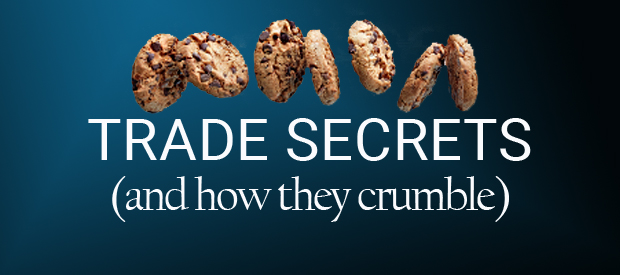Franchise 101: The Secret is Not in the Dough; and An UnBakeable Non-Compete

Franchisor 101: The Secret is Not in the Dough
A Utah federal judge denied cookie franchisor Crumbl an injunction preventing its competitor, Dirty Dozen, from opening new locations while litigation between the two franchisors was pending.
Crumbl alleged two brothers, Bradley and Bennett Maxwell, who are partial owners in Dirty Dozen, stole proprietary information from their previous affiliations with Crumbl. Bradley was a process engineer for Crumbl, and Bennett a potential Crumbl franchisee that was denied. Bradley was subject to two non-disclosure agreements and when his employment was terminated, he downloaded 640 MB of data including sales statistics, 66 recipes, a rotating cookie menu, individual store specifications, and Crumbl’s build-out specifications.
When Crumbl discovered Bradley had taken this information, they sued Dirty Dozen and Bradley, individually and later sought a preliminary injunction against Dirty Dozen for misappropriating Crumbl’s trade secrets. After a court ordered a forensic examination of Dirty Dozen’s and Bradley’s electronic data and held an evidentiary hearing, both parties stipulated to an order that required Dirty Dozen and Bradley to return all Crumbl related data accompanied with a sworn statement that all data related to Crumbl was returned.
Despite the stipulated order, Crumbl proceeded with its preliminary injunction claim that sought to prevent Dirty Dozen from opening new franchises pending a resolution of the other claims.
The court held that Crumbl established the first factor necessary for a preliminary injunction, likelihood of success on the merits, because the information Bradley unlawfully took qualifies as a trade secret.
However, the court did not find the second factor, irreparable harm, because the harm already occurred and there was no evidence Dirty Dozen incorporated Crumbl’s recipes into its recipes (including the fact that Crumbl has each franchise location make its dough in-house, whereas Dirty Dozen uses one facility to make its dough and ships it to franchise locations).
Regarding the third factor, balancing of harms, the court concluded Crumbl’s request to stop Dirty Dozen from opening new stores would severely impact its business and was not a narrowly tailored remedy because Crumbl’s proprietary information had already been returned. In consideration of the fourth factor, public interest, the court held the injunction is against the public interest as it would limit competition in the marketplace.
Ultimately, the court denied Crumbl’s motion as it only satisfied one of four factors necessary for granting a preliminary injunction.
Franchisors can face unexpected competition from those that have access to the franchise system’s trade secrets and should consult with counsel to ensure proper agreements are in place with employees, franchisees and third parties to permit seeking and obtaining equitable relief if secrets are misappropriated.
Crumbl LLC v. Dirty Dough LLC, 2023 U.S. Dist. LEXIS 142009 (D. Utah Aug. 11, 2023).

Franchisee 101: An UnBakeable Non-Compete
A Minnesota federal court denied cookie dough franchisor Cookie Dough Bliss Franchising’s motion for a temporary restraining order and preliminary injunction against a former Minnesota franchisee and its owners.
The franchisee entered into a franchise agreement with the franchisor in November 2021 to operate a retail store and a food truck using the Cookie Dough Bliss marks and proprietary information. Both sides argued that the other did not perform their respective obligations under the franchise agreement, which resulted in the franchisor terminating the franchise agreement.
After termination, the franchisee opened a cookie dough business named “UnBakeable” in the same location as its former franchise, but with a rebranded food truck, new logo and updated social media.
Cookie Dough Bliss Franchising claimed the new UnBakeable logo was confusingly similar to their font and logo and that its former franchisee was continuing to use its trade secrets, including recipes. Cookie Dough Bliss Franchising also alleged the former franchisee breached its non-compete covenant in the franchise agreement, which prevented the franchisee from competing for two years within a 30 mile radius of the franchise location after termination of the franchise agreement. Cookie Dough Bliss filed a motion for a temporary restraining order and preliminary injunction against the former franchisee.
The court denied the franchisor’s motion. The court concluded Cookie Dough Bliss did not establish it would suffer irreparable harm because they were not currently registered to sell franchises in Minnesota; the franchisor’s own website continued to list the franchisee’s mobile unit; the risk of other franchisees not abiding by their non-compete covenants was speculative and there was no evidence that monetary damages were not sufficient.
The court also determined it was unclear the franchisor would succeed on the merits of enforcing the non-compete provision, which must serve a legitimate purpose and not be broader than necessary to protect such purpose under Minnesota law. The cited case law indicated 10 to 20 miles was a more standard radius for non-competes upheld in the state and if a franchisor cannot sell franchises in the state, then these restrictions might not be necessary.
As for the third factor, balance of harms, the court found the harm to the franchisor was uncertain but the harm to the franchisee was to be put out of business. The court found the last factor, public interest neutral.
After a franchise agreement ends or is terminated, franchisees that obtained experience in their franchise industry often want to start a competing business. Franchisees nearing the end of their franchise term should seek counsel to determine the enforceability of post-term non-compete and other restrictive covenants prior to competing with a former franchisor.
Cookie Dough Bliss Franchising, LLC v. Feed Your Soul Minn., LLC, 2023 U.S. Dist. LEXIS 132808 (D. Minn. Aug. 1, 2023).